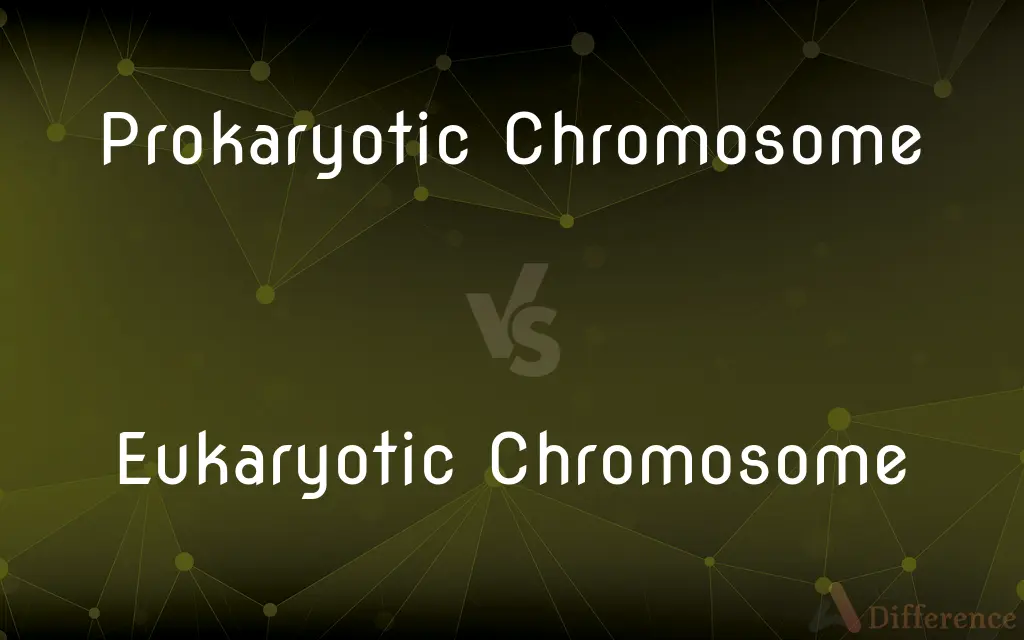Prokaryotic Chromosome vs. Eukaryotic Chromosome — What's the Difference?
By Tayyaba Rehman — Published on November 21, 2023
Prokaryotic Chromosomes are circular DNA strands in prokaryotes, while Eukaryotic Chromosomes are linear DNA in eukaryotes' cell nuclei.

Difference Between Prokaryotic Chromosome and Eukaryotic Chromosome
Table of Contents
ADVERTISEMENT
Key Differences
At the foundational level of life, Prokaryotic Chromosomes and Eukaryotic Chromosomes represent two different organizational structures of genetic material.
Prokaryotic Chromosomes can be primarily found within prokaryotic organisms, such as bacteria and archaea. These chromosomes are typically singular and circular, existing within the cell's cytoplasm due to the absence of a nucleus. Eukaryotic Chromosomes, in contrast, are housed within the nucleus of eukaryotic cells, which include plants, animals, fungi, and protists. These chromosomes are linear and can be multiple in number.
The protective structures surrounding these chromosomes also differ significantly.
Prokaryotic Chromosomes, due to their simple cellular environment, lack the protective histone proteins that Eukaryotic Chromosomes are wrapped around. Eukaryotic Chromosomes, in the safety of the nucleus, coil around histone proteins, forming structures called nucleosomes. This arrangement allows eukaryotes to pack extensive genetic information efficiently.
The replication processes of these chromosomes differ as well, demonstrating the distinction in their organization.
ADVERTISEMENT
When Prokaryotic Chromosomes replicate, the process starts at a specific point called the origin of replication, moving bidirectionally until the entire circular DNA is copied. Eukaryotic Chromosome replication, however, is more intricate, given the length and linear nature of the chromosomes. Multiple origins of replication exist on these chromosomes, ensuring efficient duplication of genetic material.
Summarily, while both Prokaryotic and Eukaryotic Chromosomes serve as carriers of genetic information, their structural differences and the organisms they inhabit make them unique in their own right.
Comparison Chart
Structure
Circular
Linear
Location
Cytoplasm
Nucleus
Associated Organisms
Bacteria and Archaea
Plants, Animals, Fungi, Protists
Histone Proteins
Absent
Present
Replication Origin
Single origin of replication
Multiple origins of replication
Compare with Definitions
Prokaryotic Chromosome
A DNA molecule without nucleosomes.
The absence of histones means the Prokaryotic Chromosome doesn't form nucleosomes.
Eukaryotic Chromosome
DNA that can be multiple and distinct in number and shape.
The number of Eukaryotic Chromosomes varies among species, with fruit flies having 8 and humans having 46.
Prokaryotic Chromosome
A singular, circular strand of DNA in prokaryotes.
The Prokaryotic Chromosome in bacteria resides freely within the cytoplasm.
Eukaryotic Chromosome
Genetic material coiled around histone proteins.
The structure of the Eukaryotic Chromosome allows it to fit large amounts of genetic information compactly.
Prokaryotic Chromosome
Genetic material not surrounded by a nuclear envelope.
The Prokaryotic Chromosome in a bacterial cell lacks protective histones.
Eukaryotic Chromosome
Chromosomes that have telomeres at their ends.
The telomeres on Eukaryotic Chromosomes protect them from degradation.
Prokaryotic Chromosome
DNA that replicates from a single origin point.
The replication of the Prokaryotic Chromosome begins at a specific point and progresses bidirectionally.
Eukaryotic Chromosome
DNA strands that replicate from multiple origin points.
The Eukaryotic Chromosome has several origins of replication to ensure efficient copying.
Prokaryotic Chromosome
The primary carrier of genetic information in prokaryotic cells.
Without the Prokaryotic Chromosome, the bacterium cannot reproduce or carry out its metabolic functions.
Eukaryotic Chromosome
Linear DNA molecules located in the cell nucleus.
Human cells have 46 Eukaryotic Chromosomes in their nuclei.
Common Curiosities
Do Eukaryotic Chromosomes have a specific replication starting point?
Eukaryotic Chromosomes have multiple origins of replication, unlike the single origin in Prokaryotic Chromosomes.
How many Prokaryotic Chromosomes are typically in a bacterial cell?
Bacterial cells, which are prokaryotic, typically have one Prokaryotic Chromosome.
Do Prokaryotic Chromosomes have a nucleus?
No, Prokaryotic Chromosomes exist in the cytoplasm because prokaryotic cells lack a nucleus.
Which chromosome type coils around histones?
Eukaryotic Chromosomes coil around histone proteins.
In which organisms would you find Eukaryotic Chromosomes?
Eukaryotic Chromosomes are found in eukaryotic organisms, including plants, animals, fungi, and protists.
What structures help in the organization of Eukaryotic Chromosomes?
Eukaryotic Chromosomes are organized with the help of histone proteins, forming nucleosomes.
Are Prokaryotic Chromosomes wrapped in nucleosomes?
No, Prokaryotic Chromosomes are not wrapped in nucleosomes as they lack histone proteins.
What protects the ends of Eukaryotic Chromosomes?
Telomeres are the protective structures at the ends of Eukaryotic Chromosomes.
Can Prokaryotic Chromosomes have plasmids?
Yes, while the main Prokaryotic Chromosome is singular and circular, prokaryotes can also have smaller circular DNA strands called plasmids.
Are Eukaryotic Chromosomes always linear?
Yes, Eukaryotic Chromosomes are linear and housed within the cell's nucleus.
How many Eukaryotic Chromosomes do humans have?
Humans have 46 Eukaryotic Chromosomes, 23 pairs, in their cells.
Are Prokaryotic Chromosomes smaller than Eukaryotic Chromosomes?
Typically, yes. Prokaryotic Chromosomes are often smaller and simpler than their eukaryotic counterparts.
Are all Eukaryotic Chromosomes of the same size?
No, Eukaryotic Chromosomes can vary in size and gene density.
Which chromosome type is found in archaea?
Archaea, like bacteria, have Prokaryotic Chromosomes.
Are Prokaryotic Chromosomes more or less complex than Eukaryotic ones?
Prokaryotic Chromosomes are generally less complex than Eukaryotic Chromosomes due to their simpler cellular environment.
Share Your Discovery

Previous Comparison
Private Cloud vs. Data Center
Next Comparison
Selendang vs. TudungAuthor Spotlight
Written by
Tayyaba RehmanTayyaba Rehman is a distinguished writer, currently serving as a primary contributor to askdifference.com. As a researcher in semantics and etymology, Tayyaba's passion for the complexity of languages and their distinctions has found a perfect home on the platform. Tayyaba delves into the intricacies of language, distinguishing between commonly confused words and phrases, thereby providing clarity for readers worldwide.
















































